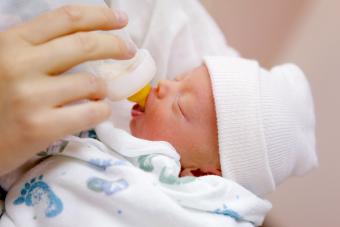
A premature delivery occurs when your baby is born before 37 weeks gestational age. If this happens, be reassured that the doctor and nurses caring for your baby will give you the support and guidance needed in order to show you ways to care for and bond with your precious newborn.
What to Expect Following a Premature Delivery
Since your baby is premature, he will likely be transferred to the NICU (neonatal intensive care unit). When you visit your baby for the first time in the NICU, expect to be a bit overwhelmed. Your baby will be in an isolette which looks like a glass box, or in a warmer which is an open bed. You will hear beeping and alarms associated with the various types of equipment and monitors that are in the NICU. Depending on your baby's specific needs, he may be connected to various tubes and sensors or may need to be placed under a special light as well.
What Should I Expect my Baby to Look Like
Depending on whether you deliver, at 24 weeks, 32 weeks or 34 weeks gestational age, your baby may have many or few of the characteristics listed below. Some may be more subtle, while others will be more apparent which include:
- Your baby may be small overall.
- Your baby's head will look larger in relation to the body.
- Your baby's skin may look transparent, and the blood vessels are more noticeable.
- Since there is a lack of fat in a premature baby, your baby's facial features will be more distinct and angular and not full and rounded like a full-term baby.
- You may notice lanugo, which is fine hair, that may be found on your baby's body.

What Should You Do Following a Premature Delivery
You will want to play an active role in your baby's care. Ask the doctor and nurses what you can do to help. Keep in mind you may be somewhat limited in the care you can give in the beginning, but as your baby gets stronger, your participation will become greater. The doctor and nurses will be there to guide you every step of the way.
Bonding With Your Premature Baby
Bonding provides a connection between you and your baby. It not only helps improve your baby's physical and emotional growth, it can help trigger your hormones to produce breast milk, and it can also give you a feeling of contentment.
However, bonding with your baby may be delayed a bit depending on your baby's health; regardless, it is important that you spend time with your baby. You may not be able to hold him yet, but you may be able to touch or gently massage him. You should also talk to him and even sing to him. These small steps are an important start to the bonding process.

Ways to Bond With Your Baby
Once your baby is strong and stable and the doctor gives the okay, you can progress to other ways to bond with your baby.
Skin-to-Skin Contact
Skin-to-skin contact, also called kangaroo care, is highly recommended and very beneficial for you and your baby. You will need to ask the doctor when you can start. There are times when it is necessary to wait; however, it is possible to do skin-to-skin contact when your baby is hooked up to the NICU equipment.
When you do start doing skin-to-skin contact, your baby will only be wearing a diaper. He will lie bare chested on your bare chest with a blanket draped over his back. Skin-to-skin contact is helpful in controlling the baby's heart rate and breathing. It can also help with breastfeeding, provide the baby better quality sleep, and will keep the baby warm. Skin-to-skin is good for you as well. It will not only increase your milk production but enable you to feel more relaxed in order to bond with your baby. You or your partner can do skin-to-skin contact for as long as is advised.
Breastfeeding Your Baby
After your baby is born, he may be too small or not ready to breastfeed. He may initially need to receive nourishment through an IV or a feeding tube. A feeding tube is tubing that extends down the nose or mouth to the stomach. You may need to pump your breast milk so it can be fed to your baby through the feeding tube. Breast milk is vital for premature babies. It is highly nutritious, will help your baby grow, and will help build up his immune system.
Once your baby is ready to suck and you are successfully producing milk, you can try to breastfeed. You may want to practice a bit first by just holding your baby to your breast. This way he can become familiar with the smell and taste. If your baby is still having trouble latching, it may be easier to feed him with a bottle. You can pump your breast milk to feed your baby by bottle while still attempting to breast feed. You can learn the different breastfeeding positions from your NICU nurses, or you can contact a La Leche League representative or a lactation consultant if you need additional help.

Self Care for Parents
Keep in mind that taking care of yourself during your recovery is also very important at this time. You need to allow yourself to recover and keep your strength up for your own well-being as well as your baby's. If you are tired, be sure to rest.
As parents, it is essential to be involved with your baby's care. However, it may be difficult if you are discharged from the hospital and must travel back and forth to spend time with your baby. This is when you should take advantage of any offers of help that come your way. If family or friends want to help with meals, cleaning the house, taking care of your older children, or give you a break if you both simply need to rest, then take them up on their offer. It will definitely help make your life a little easier.
When Your Baby Comes Home
Once your baby is able to maintain his body temperature, breathe on his own, eat by sucking on the breast or bottle, and gaining weight consistently, he will be able to come home. While many babies do not need additional medical treatment when they go home, there are some babies that do need assistance with certain medical problems.
Apnea
Your baby may experience episodes of apnea, which are pauses in his breathing. As your baby grows, the apnea does tend to get better. If your baby has mild apnea, he may be sent home with a monitor that will track his heart rate and breathing. An alarm will sound if there's an episode of apnea or if his heart rate becomes too slow.
Problems With Feeding
Your baby will need extra nourishment in order to play catch up to full-term babies. Do not assume you will just feed your baby more. This could do more harm than good especially to his sensitive G.I. system. The doctor will send you home with a feeding schedule specific for your baby that you should adhere to.
Needs Oxygen
There are a few reasons why your otherwise stable baby may need to come home with oxygen. One condition is called bronchopulmonary dysplasia (BPD). This may happen if your baby was on a ventilator for a long period and the lung tissue becomes damaged. Other reasons may include oxygen desaturation, apnea, or there are problems with the baby's airway.
Caring for Your Premature Newborn
If you have any further questions about caring for your premature newborn at home, you should discuss them thoroughly with the doctor. It can be a difficult transition bringing your baby home. It is essential that you feel comfortable and confident and know what to expect. Not only is it important for you, but it is especially important for your baby and his physical and emotional growth.







